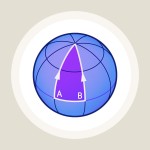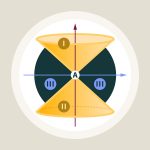Dictionary
Heisenberg’s uncertainty principle
Is a fundamental law of quantum theory, which defines the limit of precision with which two complementary physical quantities can be determined. If one of the quantities is measured with high precision, the corresponding other quantity can necessarily only be determined vaguely. In other words, it is impossible to measure simultaneously both complementary quantities with greater precision than the limit defined by the Heisenberg’s uncertainty principle.
An example for such complementary quantities are the location and the momentum of a quantum particle: Very precise determination of the location make precise statements about its momentum impossible and vice versa.










